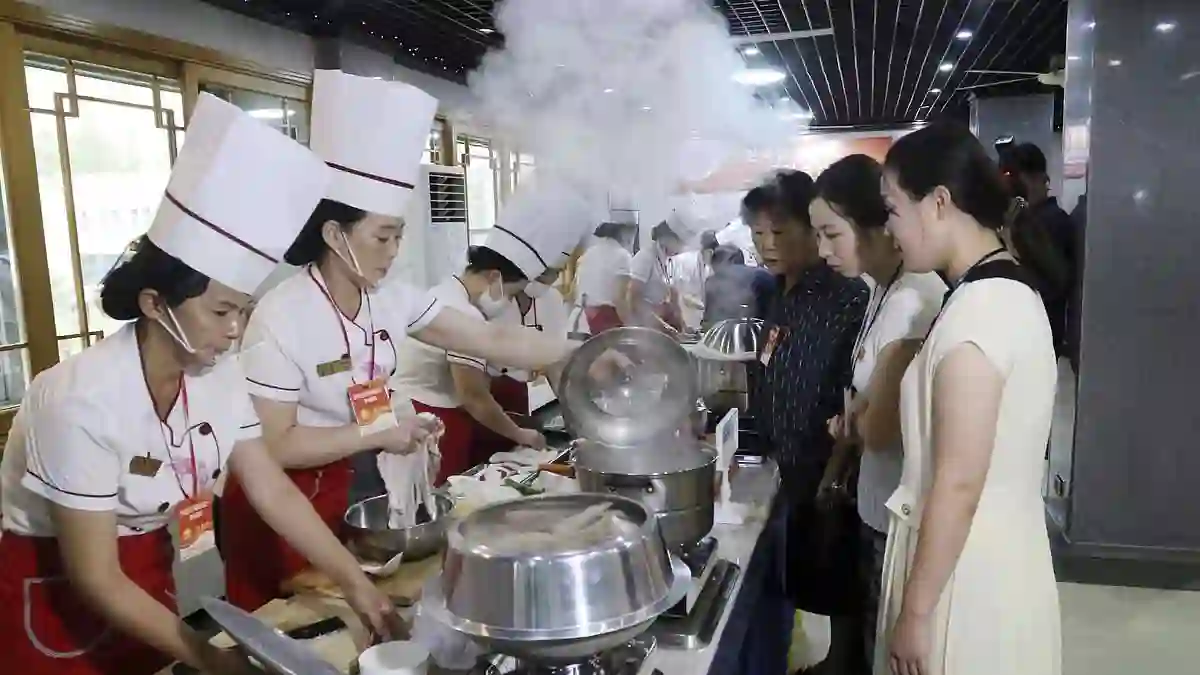While the world keeps a cautious eye on North Korea’s military maneuvers and political moves, the regime has chosen a very different way to grab headlines this week—with a national dog meat cooking competition that’s raising eyebrows across the globe.
Chefs From Across the Country Compete in Controversial Culinary Event
In a surprising showcase of culinary nationalism, nearly 200 chefs from all over North Korea gathered in Pyongyang to compete in a four-day cooking contest entirely focused on dog meat dishes—referred to locally as “sweet meat.”
The event took place at the Food Festival House on Ryomyong Street, one of the capital’s central culinary venues, and was proudly promoted by state-run outlets including the Korean Central News Agency (KCNA).
Footage broadcast by Korean Central Television showed chefs preparing various traditional meals, with the highlight being tangogi—a well-known North Korean soup made from dog meat.
Officials described the contest as a way to promote “summer energy food,” sharing techniques and improving cooking standards around what the government still considers a culturally significant dish.
Doubling Down on Tradition Despite Global Backlash
According to KCNA, this year’s event saw twice as many participants compared to last year, and state media made it clear: North Korea sees dog meat not only as part of its limited diet but also as a source of national pride.
In fact, in 2022, Pyongyang went so far as to register tangogi as a “regional intangible cultural heritage.”
This push contrasts sharply with developments just across the border.
South Korea, in response to shifting public opinion and global scrutiny, passed a law in 2024 banning the breeding, sale, and distribution of dog meat—a ban that will fully take effect by February 2027.
A Diversion Tactic Amid Worsening Food Shortages?
Analysts believe this strange culinary spectacle serves a bigger purpose.
North Korea has long suffered from chronic food shortages, and the cook-off may be a strategic attempt to highlight national culture and distract from the more dire reality many citizens face.
And this isn’t the only recent example of Kim Jong Un putting the spotlight on domestic affairs.
Kim Jong Un Resurfaces with Family at Delayed Mega Resort Opening
Just last month, the Supreme Leader made another rare public appearance—this time at the grand unveiling of a luxury beach resort in Wonsan.
The Wonsan Kalma Coastal Tourist Area has been one of Kim’s long-standing pet projects, first announced back in 2014 but heavily delayed, mainly due to the Covid-19 pandemic.
The resort finally opened to North Korean tourists on July 1, nearly six years behind schedule.
Images from the state media showed Kim touring the facility with his wife, Ri Sol Ju, who had been absent from the public eye for 17 months, and their daughter, Ju Ae, whom many speculate is being groomed to eventually take over leadership.
The resort boasts water slides, swimming pools, beachfront hotels, and rows of sunbeds—offering a sharp contrast to the harsh realities many North Koreans face outside the capital.
Behind the PR Show: Tourism Still Heavily Controlled
Despite these glossy events, it’s important to note that North Korea remains one of the most isolated countries in the world.
After nearly four years of strict Covid-era border closures, the regime finally reopened in August 2023—but under very strict conditions.
While Russian tourists were allowed back first, Western tour groups only resumed visits earlier this year, and only through state-approved, tightly monitored tours.
Visitors aren’t allowed to explore freely and are guided through carefully curated experiences.
Interestingly, North Korea and Russia recently agreed to ramp up their tourism partnership, even reintroducing a direct passenger train service between their capitals—something that hadn’t operated since 2020.
